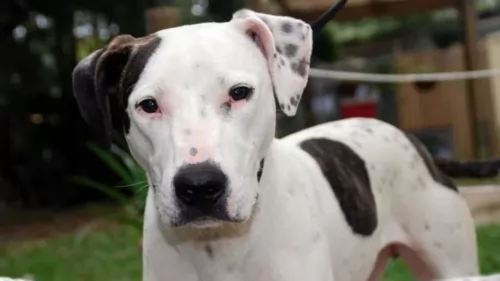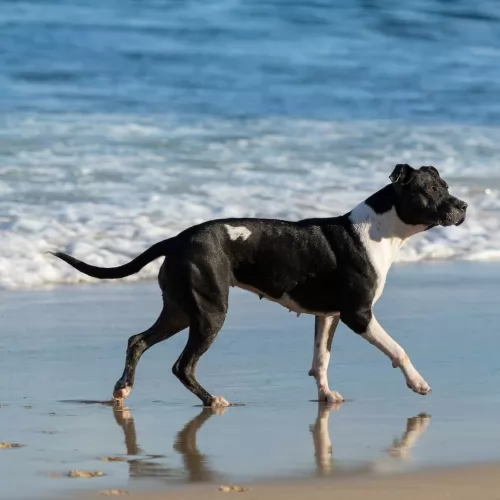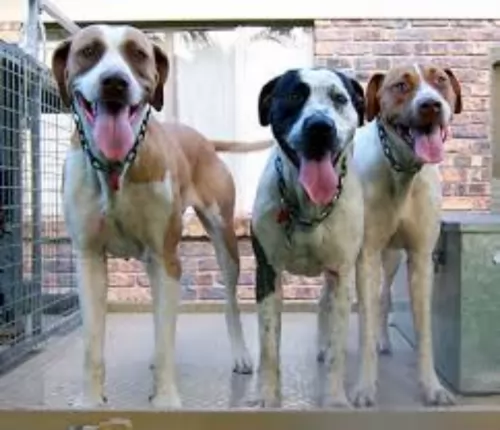 Petzlover
Petzlover Bull Arab is originated from Australia but Hamiltonstovare is originated from Sweden. Bull Arab may grow 8 cm / 4 inches higher than Hamiltonstovare. Bull Arab may weigh 23 kg / 51 pounds more than Hamiltonstovare. Both Bull Arab and Hamiltonstovare has almost same life span. Both Bull Arab and Hamiltonstovare has almost same litter size. Both Bull Arab and Hamiltonstovare requires Low Maintenance.
Bull Arab is originated from Australia but Hamiltonstovare is originated from Sweden. Bull Arab may grow 8 cm / 4 inches higher than Hamiltonstovare. Bull Arab may weigh 23 kg / 51 pounds more than Hamiltonstovare. Both Bull Arab and Hamiltonstovare has almost same life span. Both Bull Arab and Hamiltonstovare has almost same litter size. Both Bull Arab and Hamiltonstovare requires Low Maintenance.
 In the 1970’s feral pig hunters wanted a dog that could be aggressive in finding and capturing the pigs. The hunters crossed the German Shorthaired Pointer, the Bull Terrier and the Greyhound to develop the Bull Arab. It is believed that the hybrid is at least 50% Bull Terrier. It is also possible that there is some Doberman, Mastiff, Great Dane and/or Pointer in the hybrid as well.
In the 1970’s feral pig hunters wanted a dog that could be aggressive in finding and capturing the pigs. The hunters crossed the German Shorthaired Pointer, the Bull Terrier and the Greyhound to develop the Bull Arab. It is believed that the hybrid is at least 50% Bull Terrier. It is also possible that there is some Doberman, Mastiff, Great Dane and/or Pointer in the hybrid as well.
The job of the Bull Arab is to hunt out the feral pigs, grab one by the ear and hold it until the hunter arrives. They have a strong sense of smell and that is how they find the pigs.
Mike Hodgens, an Australian, developed the hybrid and added some Bloodhound as well to get that ability to smell out the pigs at great distances. They are also capable of catching buffalo and cattle. Some Australians use the breed in cattle or buffalo ranching. They are registered with the DRA or Dog Registry of America, Inc.
 Bred as a hunting hound, the Hamiltonstovare hails from Sweden, being founded in the late 1800s. He was first exhibited in Sweden in 1886.
Bred as a hunting hound, the Hamiltonstovare hails from Sweden, being founded in the late 1800s. He was first exhibited in Sweden in 1886.
Known also as the Hamilton or the Swedish Foxhound, the dog was developed by Count Adolf Hamilton who was also the founder of the Swedish Kennel Club. The dog’s ancestry includes some German Hounds as well as Harriers and English Foxhounds, and this has ensured he has excellent hunting instincts.
This dog breed got the name Hamiltonstovare in 1921 as a tribute to the person who created the breed and also the founder of the Swedish Kennel Club, Count A.P. Hamilton. The Hamiltonstovare isn’t recognized by the AKC but is recognized by the FCI and is also a member of the Foundation Stock Service. He is recognized by the Kennel Club in the UK as a Hound.
 Mike Hodgens succeeded in developing a powerful, well built dog. The Bull Arab has a powerful head and muzzle. He has moderate length drop ears and bright eyes that match the color of his coat. His chest is neither shallow nor deep and his back is straight and strong. Their tails are tapered and pointed yet the base is thick. They are a double-coated dog. They can be white with black, tan or liver, flecked or bicolor.
Mike Hodgens succeeded in developing a powerful, well built dog. The Bull Arab has a powerful head and muzzle. He has moderate length drop ears and bright eyes that match the color of his coat. His chest is neither shallow nor deep and his back is straight and strong. Their tails are tapered and pointed yet the base is thick. They are a double-coated dog. They can be white with black, tan or liver, flecked or bicolor.
 The Hamilton Hound is a good looking, well proportioned dog with an attractive, 2-layered, shortish, smooth, tri-colored coat of tan, black and white.
The Hamilton Hound is a good looking, well proportioned dog with an attractive, 2-layered, shortish, smooth, tri-colored coat of tan, black and white.
These dogs stand at about 49-61cm in height and they weigh 23 – 27kg. The eyes are brown and the ears are floppy. He is a deep chested dog with a long tail which he carries straight or which is somewhat curved. He has a longish head with a skull that is slightly arched and broad.
Friendly, social and amicable, the even-tempered Hamiltonstovare is a dog that loves to be with his human family. When you look at him you look at him as a friend as he has a calm, intelligent expression about him.
He is a stubborn, non-aggressive dog that is intelligent and this makes it easy to have him trained and socialized to make him obedient and to follow some easy instructions.
He is a very active dog and will love an owner who leads an active, outdoor life. Most Hamiltons love swimming too and he will be thrilled if you plunge in with him on a hot day.
He has always been a hunting dog, and while they love spending time with their human family, he loves the thrill of the hunt. He is a playful dog too, loving to entertain and be entertained, and he gets on well with children.
 The Bull Arab is intelligent, calm and loyal. Like Pit Bulls in the U.S., the Bull Arab has a reputation for aggression against both people and animals. There is no data to support these claims. They have been used as therapy dogs and companion animals very successfully. They are great with kids and very affectionate. The breed is cited as being used for companion and therapy animals
The Bull Arab is intelligent, calm and loyal. Like Pit Bulls in the U.S., the Bull Arab has a reputation for aggression against both people and animals. There is no data to support these claims. They have been used as therapy dogs and companion animals very successfully. They are great with kids and very affectionate. The breed is cited as being used for companion and therapy animals
 Hamiltonstovares make wonderful companions simply because they’re friendly dogs with stable personalities.
Hamiltonstovares make wonderful companions simply because they’re friendly dogs with stable personalities.
He is actually an ‘all-rounder’ dog – well proportioned and good-looking and with a solid personality to match.
He is lithe and muscled and as a multi-purpose dog, he has been used to follow scents and hunt down prey. These skills as well as his loyal characteristics have made him a versatile, sought after pet.
Another bonus when you own a dog like this is that he is also a low maintenance dog, shedding very little. He is intelligent too and easy to train, and all these qualities make him a wonderful pet to own.
 Every dog has different genetic make ups that affect them and they have different susceptibilities to illnesses. The average life expectancy of a Hamiltonstovare is between 10 and 13 years when he is looked after and well nourished with top quality food.
Every dog has different genetic make ups that affect them and they have different susceptibilities to illnesses. The average life expectancy of a Hamiltonstovare is between 10 and 13 years when he is looked after and well nourished with top quality food.
Some things to look out for are hip dysplasia, cancer, bloat and obesity.
Look out for obesity in your pet because just like with people, obesity leads to other diseases and complications in dogs such as diabetes, respiratory disorders, osteoarthritis and hypertension.
If your dog needs to lose weight, and you just don’t know how you’re going to deny him the treats he loves, speak to your vet who can even work out a weight management program for him.
Cancer is a formidable threat to all dog breeds. The most obvious sign that your dog could have cancer is abnormal swelling that gets larger under the skin. The idea is get get the lump removed and biopsied as soon as possible. Loss of appetite, weight loss, sores that don’t heal and bleeding or discharge are all signs of cancer.
 This is a working dog so he needs to eat the right kind of quality dog food. In order to avoid bloat do not feed large meals but rather feed one to two cups of food two to three times a day.
This is a working dog so he needs to eat the right kind of quality dog food. In order to avoid bloat do not feed large meals but rather feed one to two cups of food two to three times a day.
Hunting Accidents – this is the biggest reasons for health problems with the Bull Arab.
These are working dogs that are inactive when not working. They need a lot of exercise if they are not used for hunting. Agility, Tracking and hunting games, and field trials.
 The Hamiltonstovare has a double coat but even so, he is a low maintenance breed that will simply require a brush twice a week to remove dead and loose hair.
The Hamiltonstovare has a double coat but even so, he is a low maintenance breed that will simply require a brush twice a week to remove dead and loose hair.
Because he has floppy ears, it is important to check his ears because too much wax and debris can lead to a painful infection.
This is a high energy dog who will need the right amount of exercise as well as mental stimulation to be at his best. A nice walk every day will be excellent for him as well as the usual ball games in the garden.
If you get your Hamilton puppy from a breeder, it would be wise to stick to the same food they were feeding your puppy with. Suddenly changing his good could cause digestive upsets.
Every Hamilton requires top quality food that meets all his nutritional requirements. If you give him commercially manufactured food, make sure to follow the instructions with regards to the amount of food you give him as he can put on too much weight.
These dogs are known to suffer with bloat, so rather give him smaller meals than one large meal a day. Your Hamilton should never be exercised immediately after eating a meal. Remember to always ensure a bowl of fresh, cool water is always available.